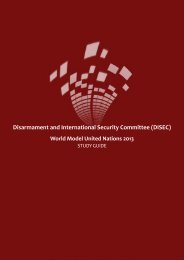Social, Humanitarian and Cultural Committee (SOCHUM)
Social, Humanitarian and Cultural Committee (SOCHUM)
Social, Humanitarian and Cultural Committee (SOCHUM)
Create successful ePaper yourself
Turn your PDF publications into a flip-book with our unique Google optimized e-Paper software.
are doing as well as the majority ethnic group,<br />
though most lag behind in development levels. Some<br />
are most affected by the loss of local l<strong>and</strong> rights,<br />
while others face widespread discrimination. Some<br />
governments accept <strong>and</strong> protect the unique cultures<br />
<strong>and</strong> practices of indigenous peoples; others force<br />
them to assimilate <strong>and</strong> even deny their existence in<br />
the first place. Before developing creative solutions<br />
to this problem then, you must uncover the specific<br />
needs of the indigenous peoples within your borders<br />
<strong>and</strong> figure out what your country’s attitude toward<br />
such groups has traditionally been.<br />
Position Papers<br />
each delegation must turn in two position papers<br />
before the start of conference. The purpose of the<br />
position paper is to give each delegation the chance<br />
to summarize their underst<strong>and</strong>ing of the issue<br />
at h<strong>and</strong>, to delineate their nation’s stance on the<br />
issue, <strong>and</strong> to propose possible solutions that could<br />
be debated in committee. Please take this chance<br />
to immerse yourself in the two topics that we will<br />
discuss in <strong>SOCHUM</strong>; I hope you will see it more as an<br />
opportunity <strong>and</strong> a challenge than a chore.<br />
When writing your position papers, there is a<br />
simple format that you should stick to; it will make<br />
it easier for you to write <strong>and</strong> for me to read. The first<br />
paragraph of your position paper should describe<br />
what you feel are the most pressing <strong>and</strong> pertinent<br />
aspects of the issue, as well as some facts that you<br />
could use in debate or to support a point <strong>and</strong> how<br />
you nation relates to the topic. the second paragraph<br />
should be used to describe what your nation thinks<br />
about the previous international action taken on the<br />
issue. Finally, your third <strong>and</strong> last paragraph should<br />
contain your ideas for possible solutions as well as<br />
courses of action that you believe should be included<br />
in a resolution. each delegation should complete one<br />
position paper per topic area. When writing, make<br />
sure you use the third person; instead of saying “I<br />
believe” or “we believe,” say “the delegation of<br />
Nation X believes” or something similar. All position<br />
papers should be written in Times New Roman<br />
12-point font, single-spaced <strong>and</strong> be approximately<br />
one page in length.<br />
Closing Remarks<br />
Thank you for taking the time to read carefully<br />
about both topic areas. I know that these topic areas<br />
are complex, <strong>and</strong> I appreciate the effort that you<br />
have put in just by reading this study guide. As you<br />
have probably realized, however, this study guide<br />
only provides a limited introduction to each topic<br />
area, <strong>and</strong> there is a wealth of additional information<br />
in books <strong>and</strong> on the Internet that I encourage you to<br />
read. the more sources you consult in your research,<br />
the more you will underst<strong>and</strong> these topics <strong>and</strong> the<br />
more rewarding your experience at WorldMuN will<br />
be. I also urge you to become an expert on the facts<br />
<strong>and</strong> positions of the country that you are selected to<br />
represent, which will make your time in committee<br />
even more enjoyable.<br />
I am very excited to meet all of you in Melbourne<br />
in March. As my last WorldMUN, I know that it will<br />
be a truly memorable opportunity, <strong>and</strong> I hope that I<br />
will be able to make your experience as unforgettable<br />
<strong>and</strong> gratifying as possible. Please do not hesitate<br />
to contact me if you have any questions about the<br />
topics areas, WorldMUN, or Model UN, or even if<br />
you just want to say hello. I look forward to being<br />
there in Melbourne as you make <strong>SOCHUM</strong> the best<br />
committee at WorldMuN 2013!<br />
Bibliography<br />
History of the <strong>Committee</strong><br />
Bailey, Sydney d. The General Assembly of the United<br />
Nations: A Study of Procedure <strong>and</strong> Practice.<br />
Westport: Greenwood Press, Inc., 1964.<br />
49<br />
Melbourne Host Directorate PTY LTD | Office of Media <strong>and</strong> Design

















